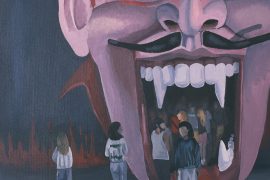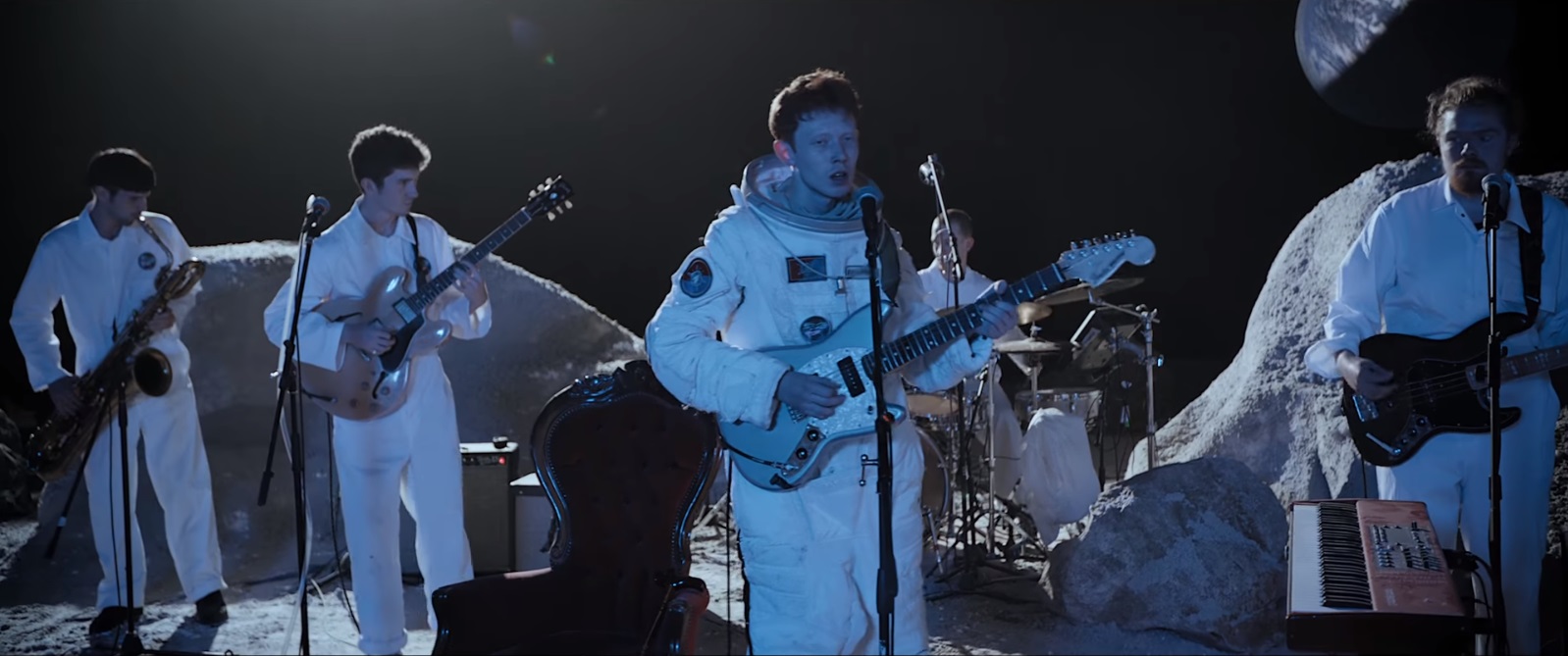A breathtakingly bittersweet soundtrack to inner healing, Flyte’s devastatingly vulnerable second album ‘This Is Really Going To Hurt’ is a majestically visceral experience. We spoke to the band about their album’s emotional journey, working with producer Andrew Sarlo, and finding their voice.
‘This Is Really Going to Hurt’ – Flyte
I think if we’ve ever been thwarted in the music world, it’s because we’ve never wanted to shout very loudly. I think we’ve been too busy looking inward.
Flyte’s new album was inspired by loss, upheaval, and personal turmoil – and in coping with that darkness, the English band tapped a wellspring of light and sonic beauty. A breathtakingly bittersweet soundtrack to inner healing, This Is Really Going To Hurt is a majestically visceral experience full of vivid harmony, sweeping melody, and devastating vulnerability.
In sharing their scars with the world, Flyte transform an otherwise intimate affair into a universally relatable triumph of the heart and soul.

Tear the pages from my notebooks
Smoke me out the window
Find your new man
A matching outfit
Post a picture so I know
But go, easy tiger
This is only going to get worse
Easy tiger, you’re a survivor
But this is really going to hurt
Use a stranger
To get back at me
A punishment to fit the crime
I heard his old man’s
A famous actor
Does he help you with your lines?
Released April 9, 2021 via Island Records, This Is Really Going To Hurt aches in all the right ways. The follow-up to Flyte’s 2017 debut album The Loved Ones (with 2019’s White Roses EP tucked in the middle) sees the British four-piece turned three-piece returning to the fore with a heavy spark: They’ve honed those stacked vocal harmonies that earned them accolades from the start, finding new ways to build a world around their voices that keeps their music feeling fresh, whilst definitively Flyte.
“We’re learning maybe for the first time ever that the vocal sound we have, it’s our sound, it’s the pillar in everything,” Flyte’s bassist Nicolas Hill says. Speaking to Atwood Magazine from the band’s studio in London, Hill is reflecting on Flyte’s sound next to his bandmates Will Taylor (lead singer & guitarist) and Jon Supran (drummer). “You actually don’t need to do all that much more around it, and our inclination is always to do as much as possible – have as much fun as we can, and discover as many different sounds as possible, and make every part count.”

Produced by Andrew Sarlo (Big Thief, Bon Iver), Justin Raisen (Angel Olsen), and mixing engineer Ali Chant (Aldous Harding), This Is Really Going To Hurt elevates Flyte’s already soaring sound through a series of ten wondrous songs that chart a slow, emotionally volatile journey out of heartbreak and isolation. Inspired by the departure of Flyte’s former member Sam Berridge and the dissolution of Will Taylor’s eight-year relationship, This Is Really Going to Hurt was itself a therapeutic record for the band to write and record.
“It was from a very dark time,” Hill notes, going on to say that by the time the band were ready to record these songs, they had already begun to see brighter, happier days. As a result, the album “starts in this very dark, sad place, and it just slowly and incrementally just pick itself up… Written in a dark cave, recorded in the sunshine.”
Yet whether they’re dwelling in the poignant pain of album opener “Easy Tiger” (“an ideal turbulent indulgence to soundtrack our moments of doubt and trouble”) or basking in the bliss of “Mistress America” and the catharsis of “Never Get to Heaven,” Flyte glow with a special sublime radiance. The band strike a particularly moving chord on the album’s second track “Losing You,” a raw reckoning of parting ways that taps into the immediacy of heartache with sweetly hypnotic melodies that ebb and flow like a musical tide.
“Every detail of ‘Losing You’ is taken directly from the week after a breakup,” Will Taylor recalls. “We actually got back together and years later it ended again, but this time the roles had been reversed. It felt strangely poignant singing a song that I was initially directing at someone who’d hurt me, to then turn it around and sing it back at myself. I don’t think Flyte was ready to take on this song until now. We were finally confident enough to just play the song and not add any extra production, and let the lyrics do all the talking. Andrew Sarlo wanted it to feel like the track never left the lonely bedroom. Like the band just came over, jammed out the song and that was that.”
Four hauntingly bittersweet stanzas capture the beauty and pain of love:
I met a girl last night, she was only 23
I brought her home to mine she gave herself away to me
But the light in the hallway and the silence in my room
Said I don’t think I’ll get used to losing you
And you were wearing that red dress when you took him upstairs
The one I bought you in New York before you made this mess
You’ve run with another, you’ve cut me through and through
And still I don’t think I’ll get used to losing you
A riverside hotel tonight
With walls that catch the city lights
Just tell me you want me I don’t care if it’s true
‘Cause I don’t think I’ll get used to losing you
Tell me where did you learn to lie so well
To love like a secret you’d never tell
You’ve stripped me of everything and I hate you, I really do
Still I don’t think I’ll get used to losing you
Flyte carry this stirring sentiment with them throughout their sophomore record, creating a plethora of musically warm and inviting safe spaces in which they and their audience may find solace, take refuge, and seek answers to questions we never wanted to ask.
Born out of darkness, This Is Really Going to Hurt really does hurt – Flyte’s powerful performance all but ensures a stirring emotional response – but in due course, we each find our own way to lighter pastures.
This Is Really Going to Hurt may have come from a dark space, but it is as much an album of loss and pain as it is one of healing and recovery. For Flyte, this album release is a massive weight off their shoulders. Hill and his band mates admit they’re “exhausted,” but “also very excited for people to actually hear the whole thing… I just wanted people to hear the album as a piece as quickly as possible, so it’s been annoying sitting on it for so long.”
Flyte connected with Atwood Magazine the day before This Is Really Going to Hurt’s release to talk about everything from their album’s emotional journey, to working with producer Andrew Sarlo and finding their voice.
Call it therapy, recovery, or rediscovery: This Is Really Going to Hurt is a musical and spiritual awakening, and we can’t wait to see where Flyte go next.
— —
:: stream/purchase Flyte here ::
A CONVERSATION WITH FLYTE

Atwood Magazine: It’s really great to meet you guys. Flyte, we are one day out from the release of your sophomore album, This Is Really Going to Hurt. How are you feeling?
Nicolas Hill: Well, I don’t know, my girlfriend, Feli, she was just in here being like, “You’re gonna be famous tomorrow. Tomorrow is gonna be when you become famous. ” And it is one of those funny things where you go, “The time we put into this thing.” It really does feel funny thinking about it, culminating in one special day, that’s not really how it works, I guess we’ve been bragging this record since well into last year. It’s only a bit of a shame we can’t have a big party, see everyone who’s involved, there’s lots of brilliant people involved in the album, a hall to get them all in the same room, but covid and the Atlantic Ocean is stopping that from happening.
I appreciate that. This album is arriving a long four years after The Loved Ones' release. How have you grown as a band between your first and second albums?
Nicolas Hill: Well, a lot of time has elapsed, we’ve changed, we’ve lost a member, which was a huge… At first it was a huge blow, but actually it turned out to be an amazing just opportunity to change our sound, and we found it. It took a while to get used to it, but I think now we’re better for it, really.
Will Taylor: And I don’t see that we’ve changed the sound necessarily, more that we just evolved, adapted, survived. I think it’s been a lot about survival for us, not in terms of the music industry or anything like that, they’ve actually been very kind to us this whole time, it’s more just about, I think, learning to define what kinda band we are to ourselves, at the very least, especially in a time when the “band” is particularly in the zeitgeist, and hasn’t been for a very long time, and I think we’ve always felt very upset when anyone has described as an out and out indie band. I think we’ve… And it’s lovely to hear it described as art when you say it, because that is what we want to see it as you wanna say it as something that’s an extension of ourselves, an expression of what we’re feeling, and we like to take our time to express that ’cause it’s a hard one to figure out. It’s a hard one to figure out what you’re feeling on a day-to-day basis, but in a much broader scheme, coming of age, and seeing the world change in the way it’s done over the last four years. Even just the last year or two years, it’s just a way of, I guess, translating all that for us, trying to make that connection between life and the music we make. And not just be a band that writes songs just for the hell of it or for the sake of it, make things with real purpose, and in order to do that, you need to take time and be very careful about each step you take.
Nicolas Hill: And have experiences, actually lived experiences. You can’t write… Yeah, I don’t think we could make this album unless we’d been through something besides making…
Jon Supran: I think the first album, our experience was that we were in a band, our experience was that we were four guys in a room playing together all the live-long day. I mean, we played together so much before that first album, and you can hear that when you hear that album, you hear four people who have got very, very good at making quite elaborate, very dance music, and this is such a different kettle of fish because this is the sound of three people and their lived experiences, I think the music was secondary.

That's really interesting. I'd love to dive deeper into that. Can you share a little about the story behind this album?
Nicolas Hill: Well, we started making an album straightaway after The Loved Ones with an idea of like, “Hey, we’re gonna make another one straightaway.” We’re one of those those bands that puts in an album every year. And I think not long into that, we realized that touring really heavily was something that was stopping us from doing that. And then the next thing was Sam leaving the band, and that was another roadblock, I’d say, and actually, the White Roses EP was an artifact, in a way, of that first attempt of Second Home. And then around the time the White Roses EP had been finished, I had broken up with my ex-girlfriend of eight years, so that was a big moment. And that wasn’t long after Sam leaving the band. So those were two big losses.
Nicolas Hill: I think we were getting into our late 20s, and life was becoming a lot more visceral and not all rose-tinted. Jon, you had some turbulent times, I’m not sure you wanna specify, but we just… But it was all…
Jon Supran: There were some shit times.
Nicolas Hill: It was all culminating in about the span of about one year. I think it was just a really bad year, like a shocker, as one would say. And that was precisely when the record was conceived in that time, so it was from a very dark time.
It sounds like we're talking about 2018, 2019-ish.
Nicolas Hill: Yeah, that’s exactly right. And then towards the end of 2019, we were having a nicer time, I’d say. We had a good summer, touring with Jess from The Staves. She’s an amazing singer, obviously, and knows exactly how to sing with other harmony singers. So that was a great time, having her join us and be a surrogate Sam. And then we did our first really long, really extensive tour of the States, and that was a real opportunity to get some distance behind us and start to feel better. We started to feel better about ourselves and have a fun time.
And by the end of 2019, I think, we decided that we wanted to make this record properly, but do it in the States, where we’d found a good time for ourselves. So by the time we got to the States in early 2020, not long before the lockdown began, we went to California, LA, stayed in this perfectly nice flat just off Sunset Boulevard, so that was surreal in itself, like some cliche band-goes-to-LA fantasy, and worked with Andrew Sarlo, who’s Big Thief’s producer. Really, really great producer and someone we were really hoping we could work with. Him saying yes, it was amazing. Justin Raisen, who we’d known from Angel Olsen, Yves Tumor and stuff like that. So by the time we made the record, I’d say we got over ourselves a bit and we were just having a nice time. So actually listening to the album, it’s a lovely thing to hear almost in chronological order. It starts in this very dark, sad place, and it just slowly and incrementally just pick itself up… “Put it on its feet and try to stride off into the sunset by the end.”
That's wonderful. It sounds like this record was made... It was written during a dark time, and then you were able to record it as you were coming out of that dark time, and now it's a relic of this era.
Nicolas Hill: Yeah, absolutely. Written in a dark cave, recorded in the sunshine.
Right, I like that a lot. It's a beautiful record. You touched on the White Roses EP – it came out in-between this time, and ''White Roses'' has become Flyte's most streamed song! To what do you attribute this success, and where do you feel that song falls in your band's history and the story?
Nicolas Hill: I think it’s a lovely-sounding song, it just sounds inviting when it comes on, I think that’s a big part of it. There’s just a lightness of touch to that EP, which I really enjoy. I think that was us trying to… That was the first exercise in minimalism and simplicity after The Loved Ones‘ complexity. And then I think people really connected with the theme of losing someone. I think we said in the press release, it was a song that was almost… It was like a funeral song, and we were referencing big goodbyes like Funeral Blues, WH Auden, and even Truman in The Truman Show‘s closing line before he walks out the door. So something to relate to them. We had lots of people get in touch saying that that had been the song that had helped them after they’d lost someone, and funny enough, lots of people saying that they played it at their wedding at the same time, so obviously it was like… But then again, that’s people not quite listening to the lyrics. Hearing a flower and putting it in. But there was obviously some kind of nice… There was a nice, broad universal quality to its sentiment that seemed to ring true to people, obviously.
I remember when I first heard that song, and then I actually dove into the words. The white roses metaphor was just so well done.
Nicolas Hill: Thank you, mate. It was written at my mom’s shed.
Nice! And having The Staves join you was an excellent touch that gave it that much more color. They're a wonderful band, I loved their latest LP.
Nicolas Hill: The nice thing is as well, I ended up living with Jess, and have moved out, but now live two doors down. So you just get… We all get them in our lives all the time, and it’s just nice ’cause you’re just in the kitchen and you start humming something, and you instantly just have two girls behind you just harmonizing.
Listen, you're a trio, they're a trio...
Nicolas Hill: Everything’s in bloody harmony.
If there were more Flyte x Staves crossovers in the future, I don't think the general public would mind. That said...
Nicolas Hill: Don’t think we would mind either.
The past three years have been marked by everything from Brexit, to the personal upheaval and turmoil you already expressed, and more. How do you feel This Is Really Going to Hurt reintroduces Flyte and captures your artistry beyond that EP and your first record?
Nicolas Hill: I think we just went inwards. Brexit, you talked about, and lots of big themes, lots of big stuff, that I think people in the UK at least have tapped into, via the political and via the national – big themes via post punk, lots of bands have – to name a few, like you’ve got Fontaines and IDLES and Shame. There’s a long list of bands that have taken that path, whether it’s very outward and they’re expressing frustration and anger and literally able to articulate it by almost speaking rather than singing, and go there into that political realm.
I think we did quite the opposite, I think we just went quieter and more introspective and more inwards. I think if we’ve ever been thwarted in the music world, it’s because we’ve never wanted to shout very loudly. I think we’ve been too busy looking inward.
What I would say is that gives your music a little bit of that timeless quality, where it doesn't matter when someone's listening to it, because they're gonna connect with these emotions no matter what's going on in the greater world, because they're more consumed with what's going on in their immediate surroundings.
Nicolas Hill: Yeah, and hopefully, most of all with this album, because it was entirely inspired by introspection. And not all that much outside influence musically, that in terms of taking, borrowing things from other people. I don’t think I really listen to music much. Quite possibly, ’cause music is squandered after a relationship is over in so many ways. There is almost nothing you can listen to.
Yeah. What was your vision going into this record? We talked a little bit about the stuff that happened around it and that inspired it, but I'd love to get a sense for... Once you honed in and said, ''Okay, we're gonna do this,'' what was your hope for it, what were your goals, and did that change over the course of recording it?
Nicolas Hill: I think definitely our goals changed. I think we ended up with something far different to what we thought, what we thought we were gonna have when we set out, nut I think all records evolve like that when you’re making them that. I don’t know, I don’t think we had a goal at the start, did we? It was like…
Jon Supran: No, I think we made the album, we thought we were gonna make to a certain extent, but one thing we did learn was that there was a chronology happening as we made it. The tracklisting was like, there was only one option really for the tracklisting. I tried so many different ways to order the album, and there was just no way it couldn’t be those exact tracks in that exact order, and it makes perfect sense. But that was a nice thing to realize what we were doing.
Nicolas Hill: And as we realized what was happening, it was like old songs suddenly came more sharply into focus. Like “Losing You” is an old song, and “Never Get To Heaven” – [they] were just two songs that were on the shelf for a while, and suddenly they started making sense for this record.
Can we talk a little bit more about the tracklisting and the story this album is sharing with its audience?
Nicolas Hill: Yeah, I think it’s “Easy Tiger” as the track that opens the door, and what you see behind that door is a sad, lonely person wrought with insecurity and paranoia and guilt. And the title of the album, This Is Really Going to Hurt, it gets repeated. It’s pretty clear what’s going on. It’s a very stark image. And it’s in a very small, confined space. It then moves, not that far forward with “Losing You,” but at least it lets the sun shine a little bit on you, and it starts to feel a little bit more open, like maybe some friends have joined you in the room. But it’s still very much this painful, With Or Without You themed, very direct, breakup song. And then as a bit of relief, you get to have that I’ve Got A Girl moment which is very much the band together singing about a band member leaving, rather than about the relationship. I think it’s the one point in the album that the relationship isn’t sung about, that’s entirely about the band member who’s leaving, so Zan gets his one moment there, and we get our one moment to be a band letting go a bit.
Jon Supran: Yeah, and thrash out a bit.
Nicolas Hill: Yeah and doing two guitars solos, and after having done no guitars solos ever, suddenly two. And then Under The Skin is that really big explosive, angry feeling. So I think already at this point, you’re moving systematically through every shade of emotion to the post-breakup period can bring you. And then Everyone’s A Winner is there to… As you’re sifting through the rubble, you’re getting this God’s-eye view of the whole thing, and you’re looking at much broader themes all of a sudden, and it’s starting to feel a lot more final.
And then I think from then on, from the second half, things start to open up a lot more, there’s even little touches of new things that are coming, and warning potential new relationships, not to get involved, there’s a bit of foreboding happening, but also the band is getting more organic, more natural, more loose, more live. We’re getting some guest players in all of a sudden, we’re very much in LA at this point, and strings and trumpet solos, and we’re starting to have fun with it, until you get finally to that “Mistress America” optimism, which is very much also on that tour that took us away from London, took us away from the gray feeling of England. And then there’s a nice positive question mark at the end, “Where do we run to now?” and it fades away almost gloriously, in a way. And it feels like the whole story is told then, and then there’s almost this little reflective epilogue at the end, that we get to heaven. So if you tried to put that in any other order, It just would ruin that flow.
I appreciate that. It's really wonderful to hear you tell the story through the songs. It's not a perspective I would've necessarily picked up right away.
Nicolas Hill: Well, you know…
I know. In the title track you sing, “Easy tiger, this is only gonna get worse. Easy tiger, you're a survivor, this is really going to hurt.” Why name the album after this line?
Nicolas Hill: It just sounded perfect, really. It’s funny, we did think… Is this a bit of a long sentence-y title, it’d be cool if… Titles are great when it’s just one word or two words, “This is really going to…” They’re all rubbish words on their own. And so for a while we were like, “Oh, then we’re gonna come up with a punchier title, and that’s gonna get better.” But again, same with the tracklisting, there was just nothing else that could’ve been called, it really was the perfect way to express what… I love the feeling of there being almost like an emotional warning on the front of the album before people hear it – the emotional equivalent of parental guidance.
I love the feeling of there being almost like an emotional warning on the front of the album before people hear it – the emotional equivalent of parental guidance.
It's cool because you talked about how there is just this seeping darkness, but your music is not inherently dark, I would say ''Easy Tiger'' might be the darkest track on the record – it definitely set the tone when you released it last year, and I understand why you open the album with it.
Going a few songs in, ''I've got a girl, wait for the joke to end,
Nicolas Hill: Yeah, we were having a lot of fun with it. So we were trying to get that lyric finished altogether around a campfire in Scotland. I remember having a… There being a lot of glee about the lion “tied to the headboard between two nightstand.” We kept batting that around the fire until it was like, “Yeah, that’s a great line.” And we uncovered, I suppose, the sentiment as we wrote the lyric, because it was just a feel, initially, and I think in the process of seeking out that lyric, we were like, “Oh, this is about Sam, this is completely… “This is our way of thinking about this moment that happened to us.” And I think we’d realized that the solution to writing, certainly at that point, was just like, “If there’s a story to tell, tell it, and tell it as honestly as possible.” And then I think we were pretty far into the night when we recorded it, it was like 2:00 in the morning, maybe, I think we were drinking quite a lot of beer, and maybe smoked us a joint or something like that. I think we were in that kinda place, like 2:00 in the morning, very, very in a specific place, and I think it was just a really good feel that came outta that.
Jon Supran: Yeah, the lines were a bit bland, it wasn’t perfect, it was a lot of groove and feel to it.
Nicolas Hill: Yeah, I love listening to Jon’s drums, and Nick’s base in that track, ’cause you can hear they just… Neither of you guys had a part.
Jon Supran: Plan, yeah. We never had a plan.
Nicolas Hill: No. It was just a feel. And so this is a really lovely sense of it just being an evolution throughout the track of how elaborate that you think you can push that plot to go, and all those nice little melodic notes that come through. And then we would… Actually, we start that track off in Tim Rice Oaxley’s home studio, he’s in a band called Keane, and he’d been a friend of Jess’ in the States, and she put on to him, and he harbored us in his home studio for a bit. And so that piano was the Keane piano, the one that everything they ever did is… That sound is on that piano.
And, so I think we were really, “Well, we’ve gotta use this piano, it’s gotta get on the record somehow.” And it’s this electric Yamaha, there’s this big spanky sound you get out of it, and put the mic on the strings themselves, and chuck it into an amp and dirty it up, and that’s a really cool aspect of the track. It’s a real central column of the track, isn’t it? That piano, just bashing all the way through, and that was Jon playing that.
Nice. So if I A/B this and “Somewhere Only We Know,” I'll...
Nicolas Hill: It’ll be uncanny.
That's awesome. You started talking about the music and the sounds, I'd love to segue to talk about just the way in which the band, as a musical entity has also evolved. If I talked about Flyte four years ago, you very much felt like a folk-influenced pop band, a lot of Beatles influence in the first record, but at the same time, very folksy, and you still carry those harmonies through. But how do you define your sound and the music you make these days?
Nicolas Hill: I don’t have an answer.
Jon Supran: No, I don’t really know.
Nicolas Hill: I mean, I don’t know, I really don’t know. I mean, the tracks sound… They don’t sound the same. They’re not coming from the same… Similar place, I think the Times just called us folk rock or something like that.
Jon Supran: Yeah. I prefer not to have a label.
Nicolas Hill: I mean, Folk-Rock, that just doesn’t sound right at all.
Jon Supran: No. I want people to make their own minds up.
Nicolas Hill: Yeah, and indie rock is not our bag. There’s no good answer, to be honest.
I always think Mumford and Sons whenever I think about folk rock, and this is not that... But we give words their meaning. Labels aside, what were you chasing making these sounds? It's a bigger production, but you stayed true to your harmony roots.
Nicolas Hill: Yeah, we’re making more music now, actually, and we’re learning maybe for the first time ever that the vocal sound we have, it’s our sound, it’s the pillar in everything. You actually don’t need to do all that much more around it, and our inclination is always to do as much as possible. Have as much fun as we can, and discover as many different sounds as possible, and make every part count. It was actually when we’re working with Andrew Sarlow on “Losing You,” he was very adamant that we didn’t add too much else to what was just there at it’s core. And those were the favorite songs on the album, “Losing You” and “Never Get To Heaven,” the two we produced with Andrew, because there’s the least going on. “Never Get to Heaven” is just a guitar and three voices, and it sounds just as big as Under the Skin, which has got an orchestra of instruments in it.
I was really moved by your recent “live” showcase, and first of all, it was beautiful, I thought it was wonderful, I thought it was at a time when we can't get together and experience your music live, I thought it really did capture what you have become as performers over the years, and you're clearly just ready to bring this record on the road. I was really moved when you opened your set with “Mistress America” and I’d love to learn more about this song. How did it come about?
Nicolas Hill: Well, I think it gains an extra level of gravity when we do it acapella like that, the way it just adds this extra emotional layer, I suppose, and in so many ways, I wish we’d done that version for the album ’cause it’s really strong hearing it like that. But that one is really about leaving behind you all the baggage, all the negative energy that you can accrue from being in the world of music. And I picture all these shitty little venues and toilet tours that the UK offers artists starting out. And I think the kinda hopelessness and the sheer impossibility of having success, and I think that song, there’s a nice feeling of… And obviously, I think that extends beyond us and beyond our career, I think it’s just a feeling of a little bit light at the end of the tunnel, maybe, maybe just glimmering some kind of a little bit of hope there. Feeling like… And when it was written, at the time, it was still very much, Trump was in power, Brexit was in full swing, still is. And it’s just trying to, I guess, express how we were feeling when we were pushing out across these big, open roads in America, and chucking a lot of our emotional litter outta the window.
Got it. Is toilet tour a copyrighted phrase? 'Cause I absolutely love it.
Nicolas Hill: It was a well-used phrase over here, but you can have it! [laughs] I’ve definitely learned a new appreciation of this record just from talking to you about it.
Do you guys have any personal favorite highlights off the record? Do you all share the same favorites, or do you have different songs that you gravitate to?
Nicolas Hill: We hate them equally at this point.
Oh, wonderful, good.
Nicolas Hill: Jon, what’s your favorite record?
Jon Supran: I’d probably say one of the Andrew tracks. I mean I think losing it really helped us to unlock something in the way that we play and record, and make music as a whole in general. Instead of similar… It’s a symbol for moving forward, I think, to the next album, at least, that where we’re making it, we’ve got head space in mind now. How to approach recording and songwriting and being satisfied with something that you have, and less perfectionist, I think, and trusting that what you’ve made is actually… Is really good…
Will Taylor: Yeah. Trusting ourselves a little bit more. Losing You, when it comes on is… It just sounds great every time. Every time it comes on any system, I’m like, “Oh yeah, wicked, that sounds fucking great.”
Nicolas Hill: I remember I just… I think “Losing You” is my favorite, ’cause I remember leaving LA and being on the plane and just having just a week to listen to it, and just thinking like, “this is… ” It was such a nice end of the chapter, ’cause it’s the last thing we recorded. And it was the best, I think it was the best thing we recorded. It’s probably the best thing we’d ever recorded, I think, that song. And I just remember being like, “That was just a nice full stop to our trip.”
Jon Supran: I really like Love Is An Accident as well. I think that sounds great, that one. You can tell with the kind of musicians behind it, because I think we’re looking for sonic, in a way, more than melody, ’cause you get so tired of those initial core things.
I know what you mean.
Nicolas Hill: And I really love “These Women,” I like how little of a fuck it seems to give.
That's wonderful. It's sounds like working with Sarlo really unlocked something for you guys.
Nicolas Hill: Yeah, 100%. And he didn’t just produce those two tracks, he mixed the whole record, and he did bring more of that to all the other tracks too, and really helped shed a bit of flab…
Jon Supran: Wait, unnecessary flab.
Nicolas Hill: A little extra flab, cut away some of the unnecessary over-dubs, and just streamlined and simplified it a bit. He was a really integral part that… Yeah, I’m working out, really. Full credit to him.
Would you work with him again in the future?
Nicolas Hill: Well, we’re hoping to. The trouble is with someone like Andrew, he teaches you, you don’t really need to work with anyone, ’cause it’s just, you’ve gotta just be you.
He's the “teach a man to fish” kinda guy.
Nicolas Hill: Exactly. Yeah.
Jon Supran: Anti-production producer.
Nicolas Hill: Yeah.
That's fantastic, he's actively losing himself business.
Nicolas Hill: Yeah, yeah, precisely.
Obviously, I have tons of respect for him as a producer, but you never know how much a producer... How much of a part of producer plays in the art, right? Until you get a little bit deeper into it and figure out what their role was.
Jon Supran: Yeah, I mean I will say for Andrew, beyond what we’ve said about him, he is just a phenomenal engineer. And he’s just got a tremendous ear. He just knows how to make something sound as phenomenal as it can sound. Just a great engineer.
Well, I'm excited that he taught three men to fish! Going back to the album one last time, you are clearly a lyrically forward band: Do you have any favorite lyrics in these songs?
Nicolas Hill: I really like the third verse in Everyone’s A Winner, I think that’s great ’cause I think it’s an example of the least, lyric-y, least poetic version of our writing, which I quite like, the darkness of some of the lyrics on this record. I really like Easy Tiger for that same reason.
I'm pulling that up.
Nicolas Hill: The third verse is the one that goes, “Everything’s forever, except the dog in the chair, and the bedroom that we share, and the friends who must choose which one of us would they wish to lose.”
That's a good line. What do you hope listeners take away from This Is Really Going to Hurt, and what have you taken away from creating it and now putting it out?
Nicolas Hill: Well, a big part of me hopes the fans that we’ve had since we were starting out back in 2014 have grown with us… that they’ve grown with us and they can relate to the album the way that we related to it, as we were making it.
That's wonderful. Now that we've had all this conversation about it, I just wanna go back to my starting question, we're just a day before its release. What are you feeling?
Nicolas Hill: Exhausted… But we’re very, very, also very excited for people to actually hear the whole thing, I’m not a fan of just putting out a single, and then another thing, I just wanted people to hear the album as a piece as quickly as possible, and so it’s been annoying sitting on it for so long, I’m just relieved that tomorrow, people will just have that bloody thing.
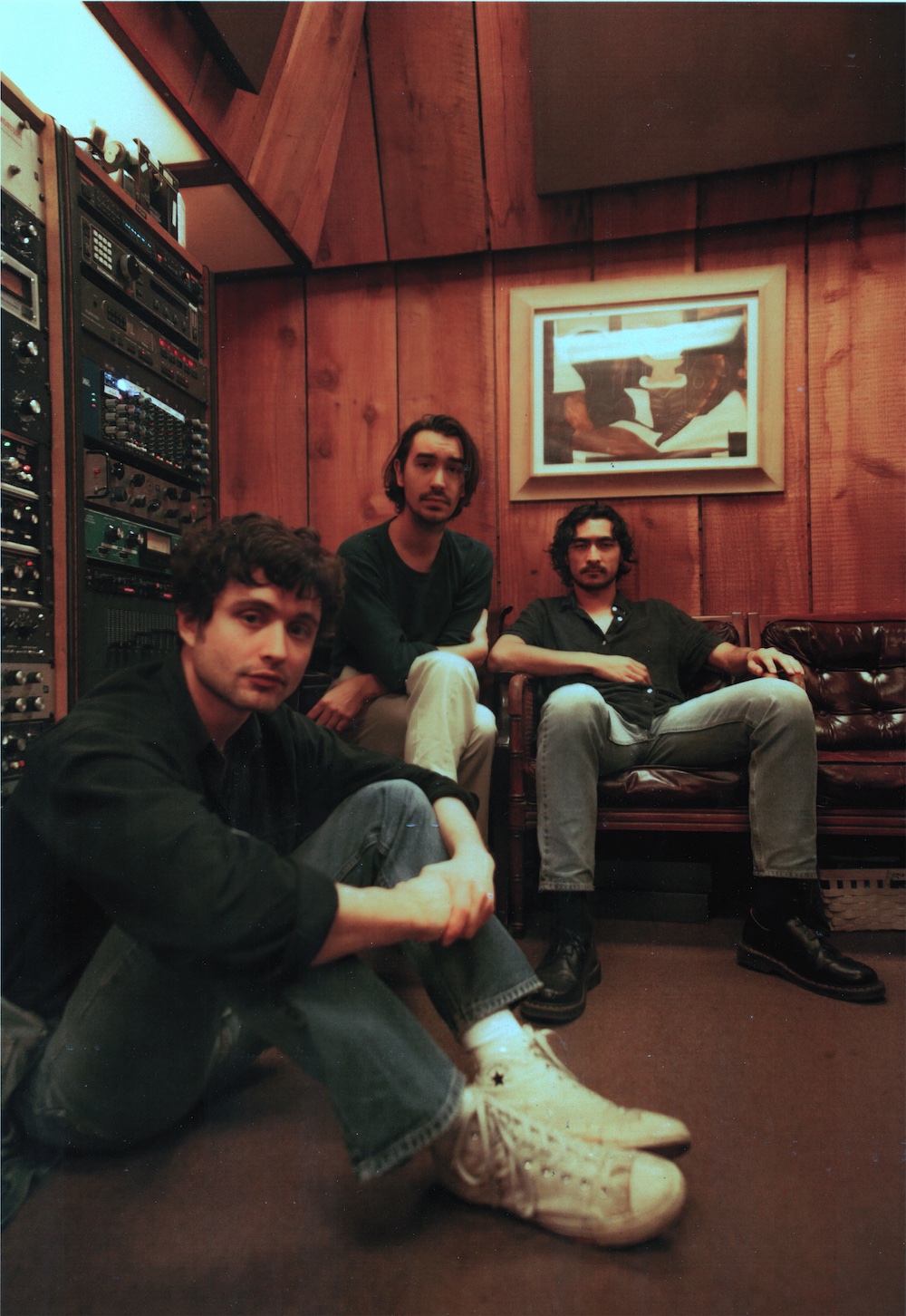
I know that this album wasn't supposed to wait this long, but what are your plans for moving forward from this? I know that the UK just got out of lockdown very, very recently.
Nicolas Hill: I think we’d love this time around to not wait as long between them, I think we’d like to… I think there’s a lot we have to say still post finishing this album, and there’s a lot we wanna get off our chest in a different way. So I think we all wanted… You were saying this Jon, it’d be nice to just make an album that wasn’t necessarily less…
Jon Supran: High stakes.
Nicolas Hill: Well, making a record that was happy would be good and is warm and had a good warmth, and a vein of happiness running through it.
Or if it's a happy record, does it have to have sad melodies?
Nicolas Hill: Well this is the thing, I think that it doesn’t really matter what the music does in terms of sentiment, because we’ve learned that from This is Really Gonna Hurt, there’s loads of songs that people would be forgiven in assuming it was a happy song.
That's true.
Nicolas Hill: But you just need to hear it to realize this is fucking bleak. And maybe we could just do the reverse with the next one, but we wanna enforce imitations on ourselves even more, we actually have this cassette machine that John found, a two-track cassette machine, two-track, actual cassette recorder. And we’re actually exclusively just limiting ourselves to that, and no computers.
That's incredible. Has it been a challenge?
Nicolas Hill: No, it just makes things so much easier I hate computers.
Jon Supran: Don’t tell anyone else this is our secret weapon, you can’t actually let anyone else know that cassettes are really good.
I mean, that's really funny. I wrote a thesis once upon a time back in school about the Beatles and how they added with Revolver, how they found a way to multitrack and multitrack. And they were in the process of building up. And you're talking about the opposite in terms of just really scaling down to bare bones.
Nicolas Hill: Well, I’d love to scale down so that we can build up again, get to that place where they were, where they were able to then be excited about making Revolver, because it’s a problem when you have too much to play with.
You have the entire world of possibility, so how do you figure out what you wanna make? But that's what you do. What artists are you listening to these days that you would recommend to our readers?
Nicolas Hill: Oh god. I have to check my phone. I reckon I’m a bit… I’ve actually had to put a ban in the house on a Adrian Lincoln and Big Thief, and because of that, I found an alternative outlet through Sharon Venetin, but definitely, personally, I’m speaking for myself here obviously, really just hooked on those intelligent, more often than not female, American, lyricist songwriters, who have a fucking great band with them, but I’ve got no really great hot tip for you this instance. What are we saying? Are there any UK artists?
Jon Supran: Are there any UK artists?
Nicolas Hill: Are there any UK artists?
Jon Supran: There’s loads. We’d be lying if we actually said anything that we listen to, ’cause none of us really have much new music coming in at the moment. I’m pretty happy with the old stuff.
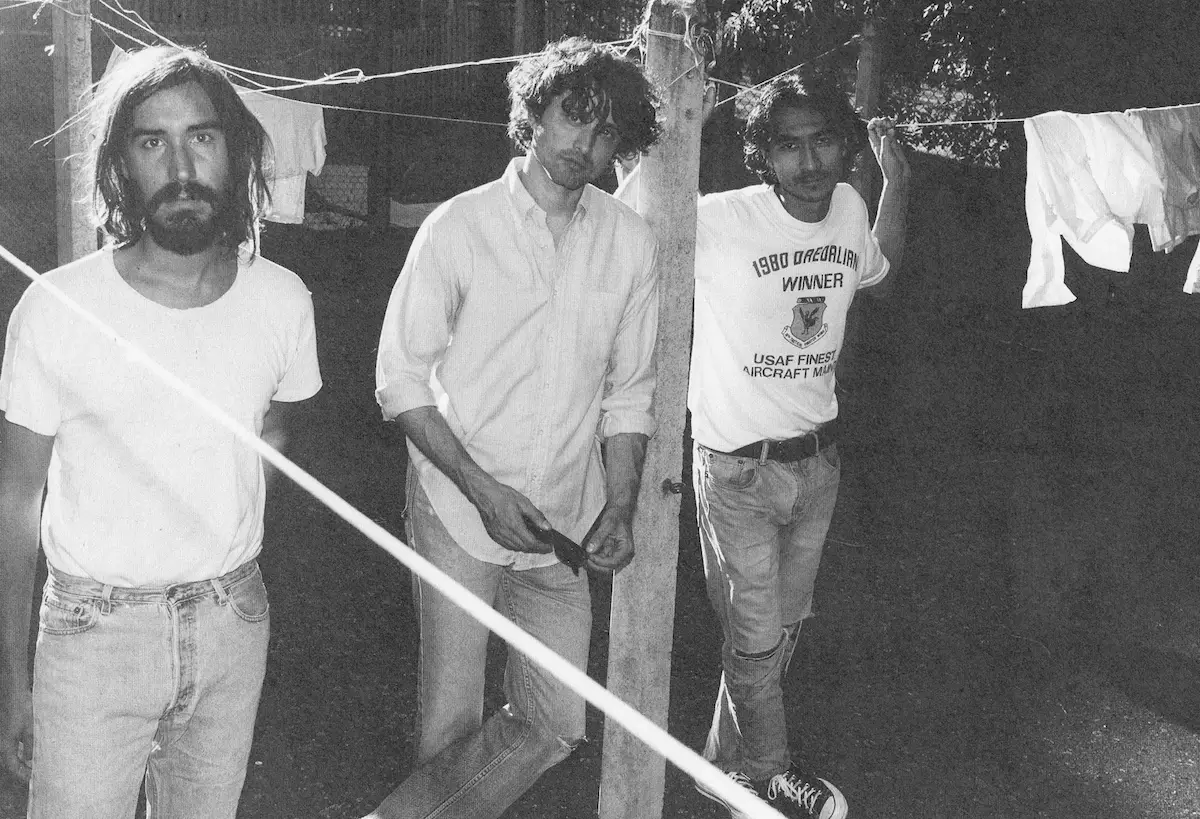
I was talking to this one artist who hunkered down in some Airbnb in San Francisco to make his last album, and what he told me is, he doesn't listen to any music in order to make his art; he has to have nothing else coming in so that he can know it's just him – and not him trying to rip off a song he heard recently.
Nicolas Hill: And I’ve gotten to that point where it’s not like I just wanna listen to old music, I don’t like new music, or the opposite, it’s never been their attitude. I just wanna hear things that are honest and unadulterated, and there’s plenty of great stuff that comes out now that I’ve just been rubbish at remembering, but there’s always great artists that come, and they are fully honest with themselves and what they’re doing. And you hear someone doing something that they’ve naturally gravitated towards, and they’ve got good at it, and they’ve done it with their cards on the table. I just find it just difficult with so much in new music, ’cause I just see something in the way, and there’s been… You just feel like there’s something blocking you from who that person really is.
I think I understand what you're saying. Listen Flyte, thank you so much for your time; it's been a pleasure. Congratulations on your new album, and I hope to have you here in the States again soon enough.
Nicolas Hill: Cool that can’t come soon enough.
Jon Supran: Yeah can’t wait.
Nicolas Hill: You too, mate, where are you, by the way?
New York City.
Nicolas Hill: Alright, yeah, well we’ll definitely be in New York.
In better, safer, healthier times, let's all grab a drink.
Nicolas Hill: That’d be bloody great.
Will, Jon, Nick, thank you so much, have a great rest of your day, or a great rest of your night, and I really appreciate it, guys, it's been a pleasure getting to know you.
Nicolas Hill: Yep, you too, mate.
Will Taylor: See you later.
— —
:: stream/purchase Flyte here ::
— — — —

Connect to Flyte on
Facebook, Twitter, Instagram
Discover new music on Atwood Magazine
© Jan Philipzen
:: Stream Flyte ::

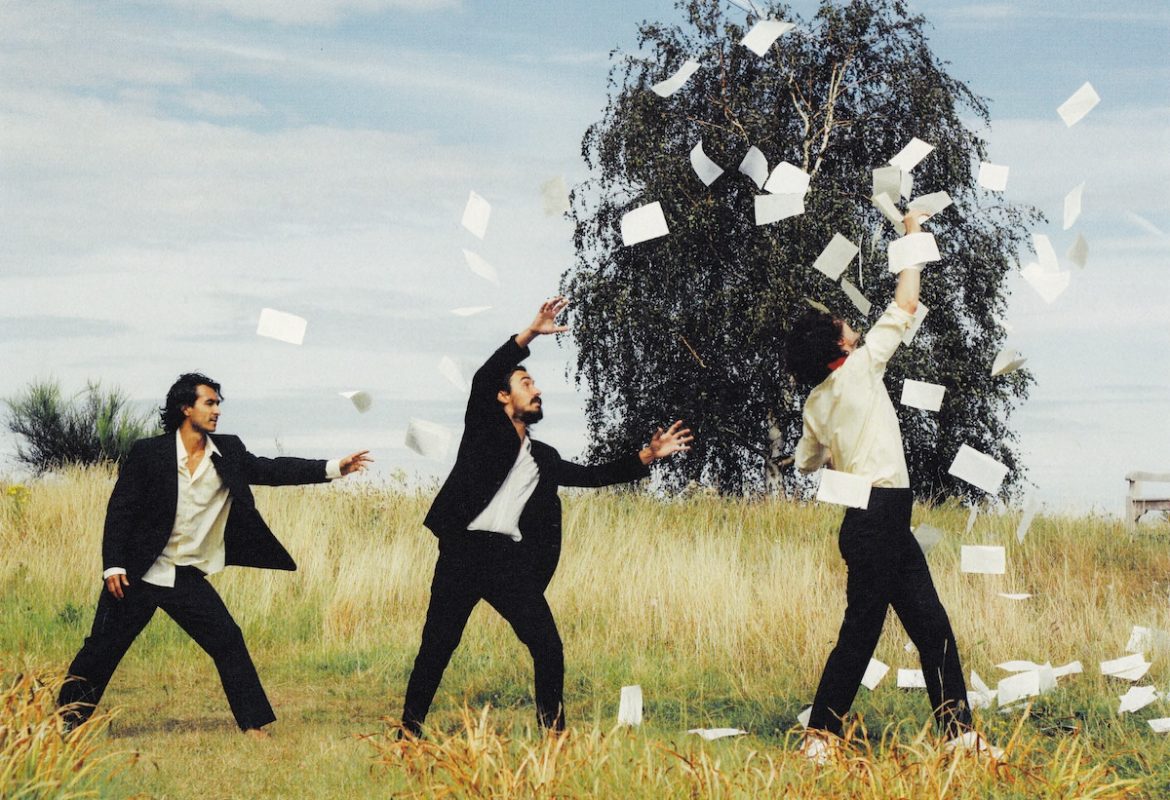
 © Jan Philipzen
© Jan Philipzen
